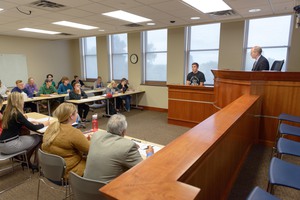CSC accepting applications for new Rural Legal Opportunities Program

CHADRON – Responding to the severe shortage of lawyers in many small Nebraska communities, Chadron State College is offering students who are interested in practicing law in a rural area of the state full tuition undergraduate scholarships and provisional acceptance to the University of Nebraska College of Law through a program developed in collaboration with UNL and the Nebraska State Bar Association.
CSC is joining Wayne State College and the University of Nebraska at Kearney in the new Rural Law Opportunities Program (RLOP), which will enroll its first group of prospective small-town lawyers in the fall of 2017. Each of the schools will provide full tuition scholarships for up to five students a year who meet admissions criteria and have an interest in a legal career, and will accept as many as 10 alternates to the program.
In addition to the scholarships, RLOP participants will be provided with mentoring, NU law school visits and Legal School Admission Test (LSAT) preparation services. CSC students in the program don’t have to choose a Legal Studies major, but must complete requirements for a minor in Legal Studies. Participants will also participate in a legal internship as part of the program. Upon graduation they will be guaranteed a seat in the NU College of Law, provided they maintain a 3.5 grade point average and meet a minimum LSAT score.
Impetus for developing the RLOP came from the Nebraska State Bar Association, which says that 11 of Nebraska’s 93 counties have no lawyers at all, and 20 others have three or fewer attorneys. A majority of those underserved counties are in the Chadron State College service region of western Nebraska.
The lack of legal assistance in rural areas means residents have limited access to the court system for resolving disputes, and must travel long distances for even basic services such as drawing up wills and contracts or conducting real estate transactions.
“The shortage means that for many Nebraskans there is no local access to the legal advice and protections afforded those in more populous areas,” said Jim Margetts, Dean of Essential Studies and Liberal Arts at CSC.
Many other states are also experiencing shortages of lawyers in rural areas, and at least eight have rural lawyer support programs, according to an article in law.com. But Nebraska’s RLOP, patterned after the successful Rural Health Opportunities Program that CSC pioneered with the University of Nebraska Medical Center in 1990, is believed to be the first of its kind in the nation, said Margetts.
CSC already has an active Justice Studies program, with focus areas that include pre-law, law enforcement, corrections, juvenile justice, forensics and para-legal studies.
Margetts said RLOP will strengthen the Justice Studies program.
“It will attract additional high-caliber potential students to CSC from within our service region,” he said.
The program is also an example of how institutions of higher education across the state can work together to benefit all Nebraskans, Margetts said.
Information about applying for the Rural Law Opportunities Program is available by contacting CSC coordinator of admission services, Erin Heide, at 308-432-6263, cscadmissions@csc.edu, or on the web at csc.edu/rlop.
Category: Campus News, Justice Studies

